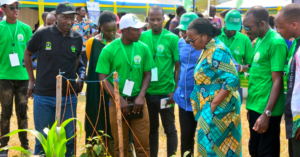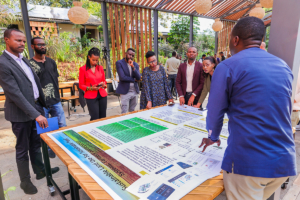The power and practice of impact networks: Lessons from food systems transformation
The power and practice of impact networks: Lessons from food systems transformation
Claudia Piacenza and
stella odhiambo
Latest posts
Share:
Networks that bring together cross-sector leaders to work on shared problems super charge impact in complex environments.
In Africa, the challenges of hunger and malnutrition remain stark: one in five people – over 282 million – are undernourished (State of Food and Agriculture (FAO 2019)), and 30% of children under five suffer from stunted growth. Despite some progress, these figures highlight how far we are from achieving key nutrition and health targets.
Compounding the issue, Sub-Saharan Africa loses over 30% of its total crop production every year – equivalent to more than USD 4 billion in value. These losses not only strain food security but also undermine efforts to lift millions out of poverty.
Amid these challenges, could the power of networks offer solutions?
Why networks (and not just collaboration) matter
One of the biggest challenges when working on complex problems is adapting to an ever-changing context.
One of the pre-conditions for operating in an adaptive way is dynamic learning. When we approach issues from just one angle, one niche expertise, or one specific or static point of view, we risk falling into the well-known trap of the blind scientist who, touching an elephant’s ear believes that she is touching a fan.
It is only by bringing together diverse perspectives that we can truly see the “big picture” (or in other words, the whole elephant).
Spoiler alert: the “big picture” is not just big – it’s rich and multifaceted.
For example, let’s look at the average age of farmers in Africa. Many organisations are working to engage youth in agriculture, recognising the importance of securing the next generation of farmers.
These efforts rightly focus on making agriculture more attractive for young farmers by lowering barriers to access it, increasing the role of tech and digital tools, and reframing the narrative around entrepreneurial opportunities.
At the recent Kenya Transform Food Festival hosted by the African Food Fellowship, we worked around this very issue – engaging youth in agriculture.
By bringing in different perspectives, the conversation quickly moved beyond traditional business models and the cost of agricultural inputs to collective narratives and educational approaches. Suddenly, we looked at a very familiar problem in an unfamiliar way.
We dived into cultural insight: in many rural areas, schools and families use farm work as punishment for undisciplined children. This shift in focus – from economic barriers to cultural narratives and educational practices – was a revelation to many. Suddenly the problem took on a new dimension, leading us to explore how to reshape perceptions about agriculture and food production, starting with very young children in schools.
While this idea may seem obvious to a sociologist or anthropologist, it was an eye-opener for participants from the private and public sectors.
So why was this breakthrough possible?
It came down to one critical approach that defines how networks work: we placed our shared objective at the centre of our discussion, rather than starting with a particular solution or organisational point of view.
As one of our Fellows once said: “Leave your logos and egos at the door and focus on the common purpose.”
The role of trust in building networks
Of course, for networks to work, we need trust at their core. I’ve heard from many leaders that building trust is the foundation for real collaboration.
Trust allows us to share not just knowledge but resources, shifting from a learning phase to actionable plans. It’s about helping everyone see each other as partners rather than competitors.
In practice, trust takes time and care – it grows as we consistently show up, follow through on commitments, and invite open dialogue. This way, networks become not only strong but safe spaces for everyone involved. We create an environment where funders, local organisations, and practitioners feel comfortable sharing ideas, knowing they’ll be met with respect and openness.
Trust is the foundational pre-condition to move from a competitive approach to a place of collaboration.
When we curate a network that wants to stimulate action (and ultimately deliver impact) we tend to focus on the support provided in the form of grants, technical assistance, facilitation and so on. If we don’t intentionally invest in building trust, our efforts are at high risk of not delivering the expected results.
Systems leadership: The key to lasting impact
Ultimately, networks are a means to an end. The end here is to improve the way people eat, their health and the health of our planet, and their inclusion in economies and societies.
Leading change that transforms our current food systems takes a special kind of leadership. Leadership that drives system transformation requires mastery of complex thinking, adaptive management, and collective action.
A recent study by the African Food Fellowship shows that while technical skills are essential, they are not enough. On top of being agronomists, food safety scientists or nutritionists, food system leaders must embody the qualities of a businessperson, an advocate, a communicator, and an organiser.
Do such leaders exist? And what is the right balance between the skills that we need to develop as individuals versus those we cultivate as part of a collective entity?
How do we know if a network is having an impact?
It’s one thing to build a network, but how do we know it’s truly making a difference? There are two indicators that matter most: network health and impact.
A healthy network is one with active participation, where each member feels valued and connected.
A healthy network provides an opportunity to engage in a variety of ways, based on individual gifts, traits, and life stages.
Impact, on the other hand, is harder to attribute directly to the work of networks. For this reason, we focus more often on contribution and influence.
An invitation to join the journey
Do you want to bring organisations and individuals together around a complex problem? Are you interested in exploring the intersection between network curation and system thinking? Get in touch! Reach out to Claudia on claudia@wasafirihub.com.
The African Food Fellowship recruits new Fellows every year. We will soon be inviting food systems leaders in Rwanda and Kenya to join the Fellowship, which offers a much-needed community of change-makers, learning opportunities about food systems leadership, and chances to collaborate with others working on similar problems.
Visit the African Food Felowship’s website for more information and keep an eye out for calls for application.








